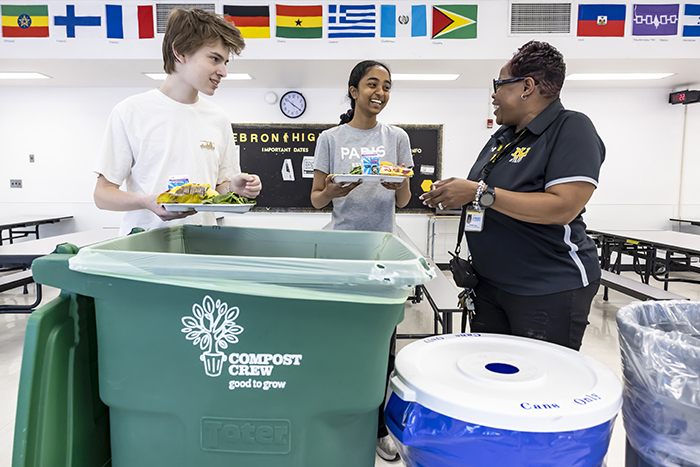Student-Led Grant Helps Reduce Food Waste, Promote Composting in Schools
June 17th, 2024
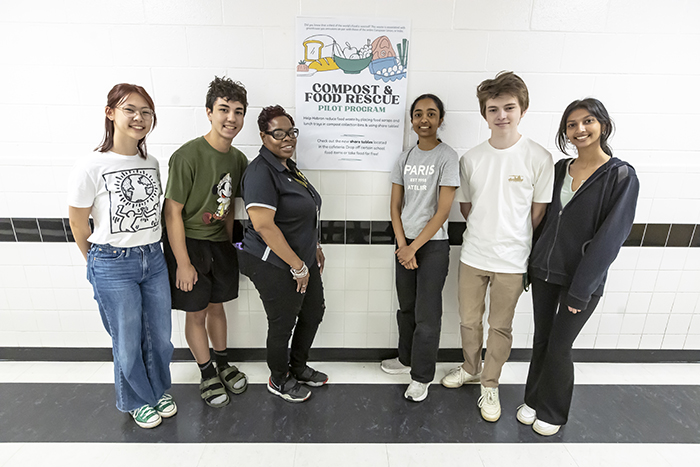
If you’ve ever been in a school lunchroom, you’ve likely seen students throw away unopened food items, along with a host of other trash.
With funding from the Maryland State Department of Education’s (MSDE) School Waste Reduction and Composting Grant, students at several HCPSS schools have been working hard to change this.
The work began in December 2023 on the heels of a conversation between Howard High School student and 2023-2024 Student Member of the Board of Education Lamia Ayaz and a Centennial High School sophomore, Angela. The latter expressed interest in establishing a composting program in HCPSS schools that would, among other things, facilitate the composting of schools’ compostable lunch trays instead of having them thrown out. Ayaz came across the student-led grant that offers up to $8,000 per school to county boards and public school districts to develop and implement programs for reducing food waste and to establish composting of pre- and post-consumer waste.
“The fact that this grant is student-led makes it really unique. While staff are there to provide guidance and support, it’s really up to students to come up with a plan to educate the school community about food waste and composting, and to engage the community in implementing that plan,” HCPSS Grants Administrator Annette Bartlett explains.
Working together with Bartlett, Ayaz and student leaders from other HCPSS schools submitted a grant application with a clear plan in mind.
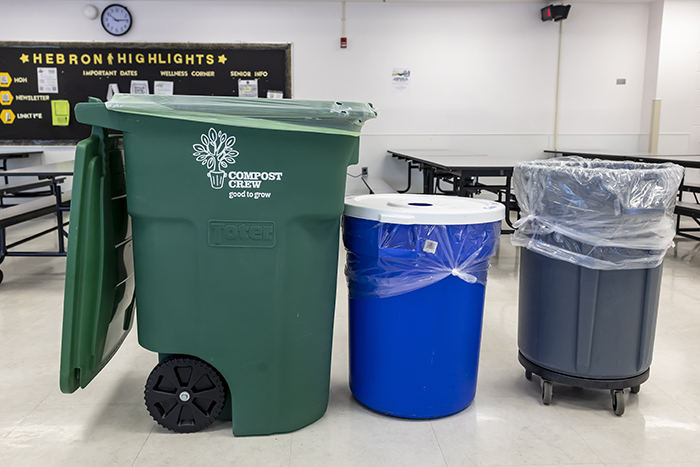
As Ayaz explains, “Our overarching goal was to bring forth a student-led initiative with three main tenets: the introduction of share tables (locations where students can place uneaten, whole food items that they do not wish to eat, and other students can take them), development of a robust composting program, and education of students on the importance of a reduction in food waste.”
As a result of the students’ efforts, five HCPSS high schools—Centennial (CHS), Howard (HOHS), Marriotts Ridge (MRHS), Mt. Hebron (MHHS), and Reservoir (RHS)—received a total of $37,000 in grant funding in March. Additionally, Guilford Park High School (GPHS) and Mount View Middle School (MVMS) were awarded grant funding in April after MSDE re-opened the grant application in March, bringing the total amount of funding HCPSS received to $51,000.
“All of the HCPSS schools participating in the MSDE grant program are working to reduce the amount of waste they generate, but they each are approaching it based on what will work best in that specific school community,” explains Bartlett.
For example, at MVMS, students in Susan Mako’s Gifted and Talented program developed a multi-pronged waste reduction plan that includes creating Amazon shopping lists for parents that are comprised of reusable school supplies; collecting food waste for tumbler composting and vermicomposting; recycling cartons, bottles, and cans; using compostable sauce cups and pizza liners so that students can recycle their compostable lunch trays; and energizing and educating students to participate in the plan by having logos, gifts, recycling bins, contests, quizzes, and more. In addition, these student leaders, now called the MVMS Green Council, recently participated in a retreat at the Robinson Nature Center to review data they collected over several weeks’ time in the cafeteria and to form a proposal for next steps.
Centennial and Howard are using their grant funding to set up share tables, compost bins, and posters across the cafeteria.
Although it’s been only a short time since the schools were awarded funds and began to implement their plans for the MSDE grant, students and staff alike say their work is making a difference.
“On our first day of implementation, we filled all four of our 65-gallon bins before the lunch shifts were even over, and students were expressing interest and stopping to read the information about our share table,” notes Ayaz.
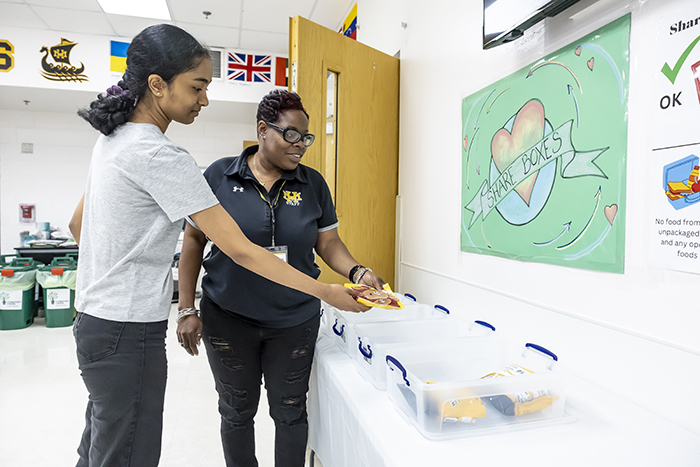
“We’ve noticed that students have become more environmentally conscious and have even been asking more questions related to environmental sustainability. We also ran into a problem where our bins were overflowing due to the amount of compostable trays we were collecting everyday,” says MHHS student Tanvi.
Reservoir High School senior Julia notes, “In just the first 12 days, Reservoir collected over 650 pounds of food scraps to be turned into compost.” In addition, with the help of volunteers, Julia and her fellow students working on the MSDE grant have also educated many RHS students about the climate impact of food waste and how composting can mitigate it.
MHHS Head Custodian Adrienne Tomlin also has seen positive changes at the school since implementing its food waste reduction plan.
As she notes, “I see students putting the food they don’t want in the share boxes, and I see students taking food from the share boxes. It makes me smile to know that the food isn’t being wasted.” The compost pickup provider estimates they’ve collected approximately 571 pounds of compostable material since the program started at MHHS in mid-May.
Even in schools where the adoption of food waste reduction and composting have taken more time, students say it’s clear that their grant-related work is having a positive impact.
“Though we have seen limited use of the compost bins and share table at GPHS, students have become more curious about why these certain practices are necessary, and what the potential impact of one small change in their routines can have on the environment,” says GPHS sophomore Juan.
“Slowly [at CHS] we are composting more and more. We have also been wasting less food in the cafeteria [by using] share tables. We have put posters all around the cafeteria as well as educated hundreds of students on the importance of composting,” adds CHS student Angela.
Tomlin estimates that collectively, the schools participating in the MSDE grant are eliminating at least 30 bags, or 1,500 pounds, of trash per week through their composting efforts.
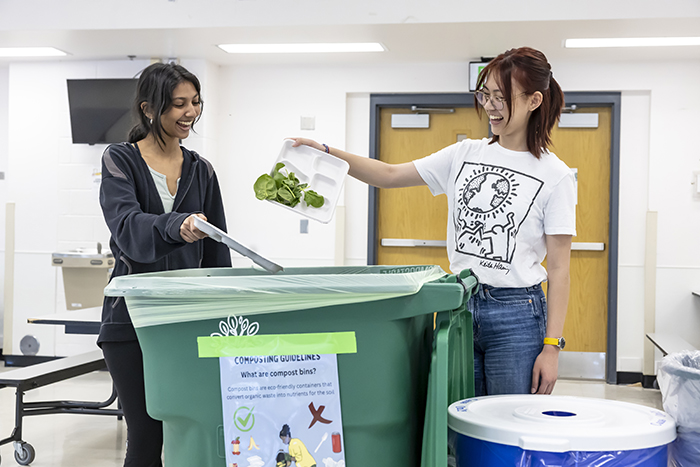
In addition to the specific gains they helped facilitate around food waste reduction and composting, students working on the MSDE grant say they have come away with valuable skills and insights.
“Throughout this process, I have personally learned the importance of communication and having the support of numerous players. Additionally, I learned of the challenges that come with creating positive change, and the ability to overcome challenges has been key in this process,” says MRHS junior Eric.
“Through my work on the Food Waste Reduction Grant, I’ve learned the importance of proper waste management and its impact on the environment. I’ve also gained insight into how educational initiatives can inspire students to adopt sustainable practices. Additionally, I’ve developed skills in project management and community engagement, which are crucial for implementing effective environmental programs,” notes Tanvi.
“I have learned that it truly takes a village to bring an initiative like this off the ground,” adds Ayaz. “I am so grateful for the collaboration between our student team, custodial staff, grants office staff, facilities staff, our environmental educator, executive leadership, and all participants for their work to bring this grant project to life! We hope that this can be a long-lasting, student-propelled program that will help to reduce food waste in our cafeterias and support our environment, and I encourage all students to participate!”
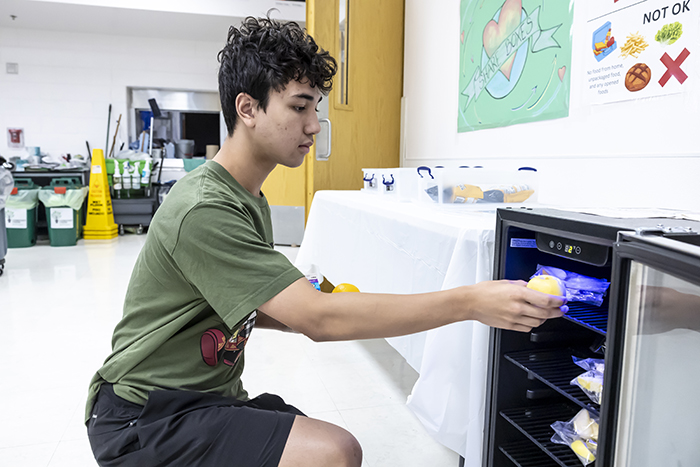
 HCPSS
HCPSS